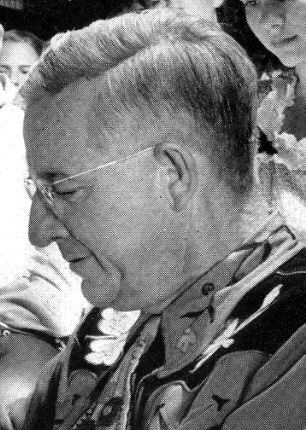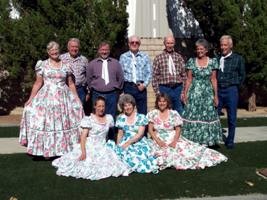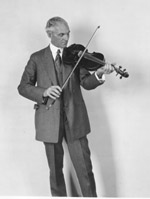

Modern American
Square Dancing
aka
Modern Western
Square Dancing
Three
phenomenons shaped
Modern American Square Dancing
in the 20th Century

Dr. Lloyd
'Pappy' Shaw
Lloyd Shaw Era

1940
Lloyd
Shaw
spent 35 years (1916 - 1951) as a school superintendent, principal and
teacher in Colorado.
He was an educator and a passionate researcher and teacher of North American
Folk Dancing in the early 1900's.
No square dance caller or square dancer, who has even a basic knowledge of
square dancing history, will deny that Lloyd Shaw is the father of modern
American Square Dancing.
From his base in Colorado, he traveled throughout the country teaching,
developing and promoting
square dancing.
As the country grew and expanded, the Quadrilles of New England merged with the Appalachian Mountain dances, forming the basis for today's Modern Square Dancing.
In the first part of the 20th
century, American dancing suffered a great decline. Quadrilles and contras
died. People two-stepped the waltz and forgot the polka and the schottische.
A rowdy form of dancing called the "barn dance" set a precedent square
dancers long have fought to overcome.
It took a great industrialist and a
superintendent from a small school in Colorado to lift the great American
folk activity out of the doldrums.
Square Dancing is a
folk dance which is truly American in origin, with historic and artistic
value. It holds a unique place in our national culture.
The majority of Americans are unaware of the richness of the art forms which
have originated here and are unique to our nation.
American Square Dancing is a case in point. Square Dancing is a
product of the cultural melting pot which makes our country great. At
it's beginning,
contributions were made by
English, French, Scottish and Irish settlers. Later,
the Spanish, Western pioneers, cowboys, miners and ranchers made their own
contributions.
More recent times have seen significant contributions by Henry Ford, Lloyd
Shaw and many innovative square dance callers.
Wikipedia Articles:
Square Dance
Modern Western
Square
Dance
Lloyd Shaw
Quadrille
Contra
Schottische

Henry Ford
"As a young man I liked to dance, but the only dances we knew were what are
now called the "old-fashioned dances" - the schottische, the polka, the
chorus jig, quadrilles, gavottes, and the like.
The younger people nowadays, so we found, did not know these dances, and the
older people - those who really needed dancing - have grown rusty. They
thought they were too old. One never gets too old to dance."
A quote by Henry Ford
in his book
'Today and Tomorrow'
Plans for a meeting of the members of the Hall of Fame were begun in 1970
with a founding committee made up of Bob Osgood, Lee Helsel, Arnie Kronenberger, and Bob VanAntwerp.
Summaries from the past ventures were studied
and, following a lengthy preparation period, eight major discussion topics
regarding the nature and needs of the activity were prepared as a partial
charter framework for the potential new organization.
During the mid 1920's, Henry Ford led a nationwide revival of interest in country fiddling and old-fashioned dancing, which swept the country.
Henry Ford organized an "Old Time Orchestra" to provide music as Benjamin Lovett, a dancing master brought from Massachusetts, taught Ford's friends and business associates, as well as the local schoolchildren, the Virginia reel, schottische, varsovienne and waltz.